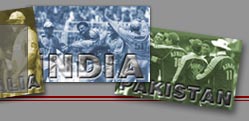|
|
| Home - Cricket |
|
Feedback | ||||||||||||||||||||||||||||||||||||||||||||||||||||||||||||||||||||||||||||||||||||||||||||||||||||||||||||||||||||||||||||||||||||||||||||||||||||||||||||||||||||||||||||||||||||||||||||||||||||||||||||||||||||||||||||||||||||||||||||||||||||||||||||||||||||||||||||||||||||||||||||||||||||||||||||||||||||||||||||
|
The final ranking
|


October 12, 2002 India now fourth; could have been second!M J Manohar Rao and Srinivas BhogleIndia are now fourth in the Rediff ODI ratings, behind Australia, Sri Lanka and South Africa. And if India had won the twice-abandoned final (which most -- except Sanath Jayasuriya -- believed that India would win), they would actually have been second, just behind Australia! Regular followers of the Rediff ODI ratings (who -- we are grateful -- continue to offer reactions or send queries) must wonder how this can happen. It couldn't have happened with the existing scheme (by which India would still have been a much more respectable fifth). But it's happening now after we have revised the ODI rating to accommodate the tournament factor. Perhaps we should quickly explain. When we introduced the Rediff ODI ratings in January 2002 we essentially adapted it from the (much more successful) Rediff test rating scheme. But ODI's have one essential difference from tests: they are frequently played in the tournament format with three or more teams participating. This also means the some of the matches are played at neutral venues (e.g. when India played Sri Lanka in the NatWest series in England). While we could accommodate neutral venues sufficiently well in our formulation, we had some difficulty in introducing a tournament factor. Our chief concern was how to give a tournament final or semi-final an additional weight using objective criteria. We therefore initially decided not to consider the 'tournament factor'; so we pretended that a tournament game was just like any normal game played in a series. Obviously this was not entirely satisfactory but it still gave us sufficiently good results, essentially because every tournament only involved three teams. But the ICC Champions Trophy, involving 12 teams, was an entirely different situation. And there is the World Cup to follow in a few months! We therefore had to seriously review our procedure. After all if India had won the ICC Champions Trophy and still stayed fifth (as they would have), readers would certainly have questioned our method (incidentally one wonders how the Wisden ODI ratings -- which essentially consider the proportion of wins, irrespective of the 'importance' of the game -- have changed after the Colombo event). The truth is that some ODI matches are definitely more 'important' than others! We fretted and fumed when India seemed incapable of winning the 'big' matches, we called the South Africans 'chokers' because they couldn't win finals and big games (seeing the way they lost to India at Colombo, they are probably still chokers!). So there is, without a doubt, the 'tournament factor' or the 'knock-out factor' which must be considered. How, then, are we to build in this factor? The basic idea is to define two indices: the first index will continue to be our ODI RBI where we give 1 point for a win, half a point for a tie and 0 points for a loss. This index will handle the 'opposition' and 'location' factors (awarding higher weights for wins against stronger teams or wins away from home). The second index will consider the 'tournament' or 'knock-out' factor. If there are two teams participating in a 'knock-out' event, then a single win suffices. So we award 1 point for a win (as we have been doing so far). If there are 3-4 teams participating (as in most cases), then a maximum of 2 wins are needed: so we give the winner 2 points out of 2, the finalist 1 point out of 2 and the loser/s 0 points out of 2. If there are 5-8 teams participating (rarely), then the winner will get 3 points out of 3. Finally in a World Cup (or ICC Champions Trophy type event) involving more than 8 teams, a maximum of 4 wins will be needed: so we give the winner 4 out of 4, the losing finalist 2 out of 4 and the losing semi-finalists 1 point out of 4. For example -- and Sourav Ganguly actually said this -- India had to "win all its four games" at Colombo to lift the ICC Trophy. To compute the tournament index we will look at a 'moving 12-month window' of tournament results. So, as on 12 October 2002, we look at the results of all tournaments played after 13 October 2002. Scanning the Cricinfo databases we find that eight tournaments have been played during the most recent 12-month window: seven of them were 'triangulars' and the eighth was the ICC Trophy (Table C contains these details). India have played in two of them: their NatWest performance earned two points out of two (2/2) while the ICC Trophy performance earned three points out of four (3/4). (A win would have been 4/4, a final defeat would have been 2/4). India's tournament index (TI) is therefore (2+3)/(2+4) = 5/6 or 83.33. To take another example, Australia got 0/2 in the VB series, 1.5/2 in the PSO series and 1/4 in the ICC to total 2.5/8 for a TI of 31.25. The procedure therefore is quite simple. Our new ODI rating will be a combination of the existing ODI RBI and the newly-defined TI. The key question (and this is really the key question!) is: how do we combine the ODI RBI and the TI. Do we simply look at, e.g., [ODI RBI + TI] /2? This wouldn't be right because it gives equal weightage to both the indices, and the gut feeling is that ODI RBI is more informative. So how about a scheme which gives the ODI RBI twice as much 'weight' as the TI? This seems better but is still subjective! (it is easy to see that we can tinker with these weights to get practically any rating that we want). We finally decided to use a scheme in which the weights are in inverse proportion to the variances of the two indices (this is a widely accepted scheme in statistics and econometrics and, generally speaking, accords the more 'consistent' or 'reliable' index a proportionately higher weight). We will be happy to send the interested reader an attachment file containing a technical appendix justifying this procedure. But should the lay reader choose to believe us (and we urge him to -- our intention is certainly not to use a statistical 'sleight-of-hand' to push India or any other team up the rankings!), then we will proceed in all haste to view our modified ratings. The current (as on Oct 12, 2002) scorecard, after the ICC Champions Trophy, for the major ODI playing teams is shown in Table A. The alert reader will notice another change: we are 'aggregating', not 'replacing', points in the scorecard. For example, having beaten South Africa in the 2000 ICC tournament at Nairobi, India had one point out of one (1/1) in the neutral venue (N) scorecard. Now, having beaten South Africa again in the 2002 tournament, we have changed '1/1' to '2/2'. If we hadn't, the 'old' '1/1' would in effect have been replaced by the 'new' '1/1' -- and the recent win would have contributed nothing to India's rating! One of our readers pointed this out. We have now decided to aggregate the most recent five matches in the neutral venue (N) entry. This aggregation is needed to overcome the anomaly just mentioned; in fact such a procedure is already being used for the home (H) and away (A) entries.
The current ODI RBI rankings are shown in Table B, below. These rankings now tell us how the teams would have been placed if we hadn't considered the new tournament index.
Table B illustrates the point that we made earlier: India would still have been fifth, almost five points behind Pakistan, in spite of such a creditable showing! And yet every cricket watcher would agree that India's current form guarantees them a place at least in the top four. Table C lists all the eight ODI tournaments held in the last 12 months and presents the tournament index for the top nine ODI-playing teams.
Table C tells an interesting tale. First, that India's tournament record during the last year has been the best -- although it is true that they haven't played too many tournaments. Sri Lanka too have performed exceptionally while Pakistan and South Africa have done sufficiently well. Australia are surprisingly off-colour. They win a lot of matches, even against strong opponents. But the tournament victory has proved to be elusive in recent times. We are now just a step away from our final verdict. To reach this verdict we must combine the ODI RBI and the TI. Table D shows the final ranking.
So our revised rating scheme finds Australia barely clinging on to their first position. They must win a few tournaments to feel truly secure. South Africa and Sri Lanka are half a whisker away. But South Africa must fancy their chances of regaining their second spot because Sri Lanka's future ODI engagements are in Australia and South Africa. India won't be easily displaced from the fourth position since they don't play any more tournaments till the World Cup. In fact if India win enough games against West Indies and New Zealand -- and Sri Lanka do not qualify for the final of the 2002-03 VB Series -- India might enter the World Cup placed third. On current form, few can argue with such a ranking. Finally, if India had won the ICC Trophy they would have been second! The rankings would then have been Australia (61.08), India (57.44), South Africa (56.78) and Sri Lanka (54.58).
M J Manohar Rao is professor and director, Department of Economics,
University of Mumbai, Mumbai; Srinivas Bhogle is scientist and head,
Information Management Division, National Aerospace Laboratories, Bangalore.
|
|||||||||||||||||||||||||||||||||||||||||||||||||||||||||||||||||||||||||||||||||||||||||||||||||||||||||||||||||||||||||||||||||||||||||||||||||||||||||||||||||||||||||||||||||||||||||||||||||||||||||||||||||||||||||||||||||||||||||||||||||||||||||||||||||||||||||||||||||||||||||||||||||||||||||||||||||||||||||||||
| Home - Cricket | Feedback | |||||||||||||||||||||||||||||||||||||||||||||||||||||||||||||||||||||||||||||||||||||||||||||||||||||||||||||||||||||||||||||||||||||||||||||||||||||||||||||||||||||||||||||||||||||||||||||||||||||||||||||||||||||||||||||||||||||||||||||||||||||||||||||||||||||||||||||||||||||||||||||||||||||||||||||||||||||||||||||